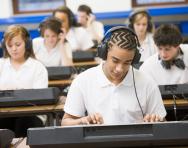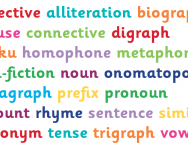Year 7 English: what your child learns

Given the size of the year group and the range of abilities within a year, most secondary schools teach English in ability sets, and your child will probably be assessed, either before they start school, or at the beginning of the term, to determine which is the best set for them. The KS3 curriculum overall is the same for all sets, but higher ability groups will be working at a higher level, while lower sets will be given more support.
What your child will learn in KS3 English
During Key Stage 3 the children will be working on a wide range of material, and English in Year 7 could include one or more of the following:
- Shakespeare
- English classic novels
- Contemporary novels
- Authors from different cultures
- Drama
- Poetry and ballads
- Journalism
- Travel writing
- Essays
- Literature on film
In KS3, English is taught with the focus on four areas:
- Reading
- Writing
- Language
- Speaking and listening
Reading in Year 7
Year 7 children are expected to be confident, fluent readers. The emphasis now is on interpretation and comprehension, and the children will be working with both written and electronic material. In KS3 there are two areas of focus for reading:
Reading for meaning
- Finding information in a text
- Using techniques such as scanning and skimming
- Looking for subtle, implied meaning
- Understanding the main point of view
- Examining the impact of multimodal text (material which uses two or more media together, such as words and pictures)
Understanding the author’s craft
Writing in Year 7
Year 7 children will be working on developing their imaginative ideas and themes, and could be working on:
- Stories
- Poems
- Scripts and screenplays
- Autobiographies
- Advertisements and persuasive writing
- Articles
- Essays
- Reviews
In this written work, the children will be concentrating on:
- Planning and drafting
- Presenting ideas logically and clearly
- Precise and imaginative vocabulary
- Spelling common words correctly
- Using correct punctuation in sentences and speech
- Structure and presentation
- Use of paragraphs
- Editing, proofreading and revising their work on screen and paper
Language in Year 7
The children will be looking at how language changes and develops.
- How spoken English varies according to region or setting
- How English has developed over time
- How English is used in different contexts
Speaking and listening in Year 7
As well as speaking and listening in class discussions, there is now also an emphasis on drama and role-play as part of English lessons. During this year the children will be encouraged to:
- Listen to a talk or discussion and pick out the main ideas
- Develop their own speaking skills, according to the listener
- Think about ways of making their speech more interesting
- Work on their group discussion skills: contributing, disagreeing and asking questions
- Put on performances, either independently or in groups, of improvised or scripted plays
Preparing for Y7 English at home
- Before your child starts school, ask your school for a reading list – this will give you an idea of the books and authors your child will be studying, and will give your some tips for summer holiday reading
- Look out for film adaptations of classic novels or plays – it’s often a good way to introduce what could be a long or tricky read
- Make time for reading – there will be more homework now, so encourage your child to set aside time, perhaps at bedtime, to read for pleasure
- If your child isn’t keen on writing, encourage them to write a blog or create a website about a hobby or interest
- If your child is expected to use a keyboard and finds it tricky, look for a touch typing course to help them with speed and accuracy
- Encourage your child to join in extra-curricular activities – secondary schools run a variety of clubs and groups, which are ideal for developing communication skills

Give your child a headstart
- FREE articles & expert information
- FREE resources & activities
- FREE homework help









